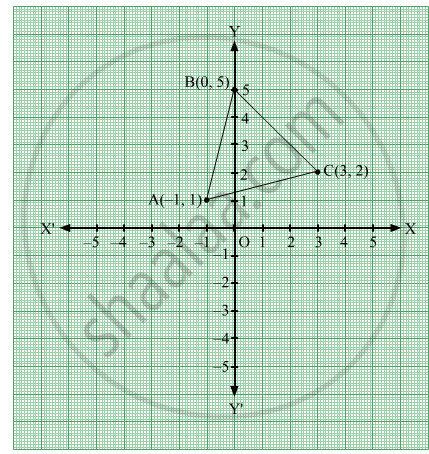Advertisements
Advertisements
Question
Find the area of the triangle whose vertices are (-1, 1), (0, 5) and (3, 2), using integration.
Solution

Let A (-1,1), B (0,5) and C (3,2)
The equation of line AB is
y -1 = `(5 -1)/(0+ 1) ("x"+1)`
y = `4"x" + 5`
The equation of line BC is
y - 5 = `(2 -5)/(3 -0) ("x" -0)`
y = `-"x"+5`
The equation of line CA is
y - 2 = `(1 -2)/(-1 -3) ("x" -3)`
y = `("x")/(4) + (5)/(4)`
Required area = Area of ΔABC
The equation of line CA is
y - 2 = `(1 -2)/(-1 -3) ("x" -3)`
y = `("x")/(4) + (5)/(4)`
Required area = Area of ΔABC
= `int_-1^0 (4x + 5) dx + int_0^3 (- x + 5) dx - int_-1^3 ( x/4 + 5/4) dx`
= `[ 2x^2 + 5x ]_-1^0 + [ -x^2/2 + 5x ]_0^3 - [ x^2/8 + 5x/4 ]_-1^3`
= `3 + 21/2 - 39/8 - 9/8`
= `15/2` sq. units
APPEARS IN
RELATED QUESTIONS
Find the integrals of the function:
cos 2x cos 4x cos 6x
Find the integrals of the function:
sin3 (2x + 1)
Find the integrals of the function:
sin3 x cos3 x
Find the integrals of the function:
sin x sin 2x sin 3x
Find the integrals of the function:
`(1-cosx)/(1 + cos x)`
Find the integrals of the function:
cos4 2x
Find the integrals of the function:
`(sin^2 x)/(1 + cos x)`
Find the integrals of the function:
`(cos 2x - cos 2 alpha)/(cos x - cos alpha)`
Find the integrals of the function:
`(sin^3 x + cos^3 x)/(sin^2x cos^2 x)`
Find the integrals of the function:
`(cos 2x)/(cos x + sin x)^2`
Find the integrals of the function:
sin−1 (cos x)
`int (e^x(1 +x))/cos^2(e^x x) dx` equals ______.
Find `int (sin^2 x - cos^2x)/(sin x cos x) dx`
Find `int dx/(x^2 + 4x + 8)`
Evaluate : \[\int\limits_0^\pi \frac{x \tan x}{\sec x \cdot cosec x}dx\] .
Find `int_ (sin "x" - cos "x" )/sqrt(1 + sin 2"x") d"x", 0 < "x" < π / 2 `
Integrate the function `cos("x + a")/sin("x + b")` w.r.t. x.
Find: `int sec^2 x /sqrt(tan^2 x+4) dx.`
Find: `intsqrt(1 - sin 2x) dx, pi/4 < x < pi/2`
`int "e"^x (cosx - sinx)"d"x` is equal to ______.
`int (sin^6x)/(cos^8x) "d"x` = ______.
Evaluate the following:
`int (cosx - cos2x)/(1 - cosx) "d"x`
Evaluate the following:
`int "e"^(tan^-1x) ((1 + x + x^2)/(1 + x^2)) "d"x`
The value of the integral `int_(1/3)^1 (x - x^3)^(1/3)/x^4 dx` is
